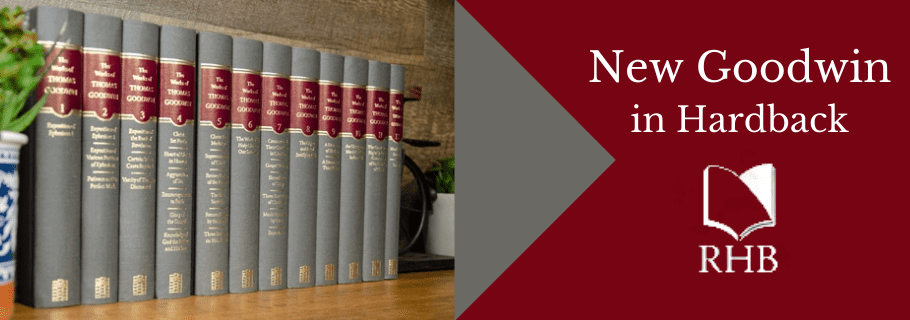This week the blog is sponsored by RHB Publications and written by Joel R. Beeke.
As a teenager, God used Thomas Goodwin’s writings more than anyone else’s to bring me to liberty in Christ and to grow me in Christ. I wept often as I read his “Christ the Mediator” at the richness and fullness of my Savior and Lord. Already then, I dreamt of one-day publishing Goodwin’s entire Works of 12 volumes in a beautiful hardcover edition. Half a century later, that dream finally became a reality.
After reading the article below, I believe you will see why Goodwin had such a profound effect on me! We pray by reading Goodwin, you will be drawn closer to our beautiful Redeemer.
This reprinting of The Works of Thomas Goodwin stands as a fitting climax to the past half-century of the rediscovery and republication of the writings of the Puritans. Renowned for intelligent piety at its Puritan best, Thomas Goodwin, ”the Atlas of independency,” stands on a par with John Owen, “the prince of Puritans,” as a theologian and an exegete, and often surpasses him in experimental depth. Slightly easier to read than Owen, Goodwin’s writings demand concentration for maximum benefit.
Those influenced by Goodwin’s writings include John Cotton, Jonathan Edwards, George Whitefield, and John Gill. Alexander Whyte confessed: “I have read no other author so much and so often. And I continue to read him to this day as if I had never read him before.” He calls Goodwin’s sermon, “Christ Dwelling in Our Hearts by Faith,” one of the ”two very greatest sermons in the English language.” Whyte aptly concludes:
Goodwin is always an interpreter, and one of a thousand …. All his work, throughout his twelve volumes, is just so much pulpit exposition and pulpit application of the Word of God …. spiritual experience-all the same, he is always so simple, so clear, so direct, so untechnical, so personal, and so pastoral.
In our generation, Puritan scholar J.I. Packer concurs: “Whyte called Goodwin ‘the greatest pulpit exegete of Paul that has ever lived,’ and perhaps justly; Goodwin’s Biblical expositions are quite unique, even among the Puritans, in the degree to which they combine theological breadth with experimental depth. John Owen saw into the mind of Paul as clearly as Goodwin-sometimes, on points of detail, more clearly-but not even Owen ever saw so deep into Paul’s heart.”
Thomas Goodwin was a prolific author and editor. During the 1630s, he coedited with John Ball the works of John Preston and Richard Sibbes. He began to publish some of his own sermons in 1636. Prior to his death, he published at least twelve devotional works, most of which were collections of sermons. The fact that they were reissued forty-seven times indicates the high demand and wide circulation of his publications.
Most of Goodwin’s major theological writings were the fruit of his riper years and were published posthumously. His unusually large corpus of treatises displays a pastoral and scholarly zeal rivaled by few Puritans.
The first collection of Goodwin’s works was published in five folio volumes in London from 1681 to 1704 under the editorship of Thankful Owen, Thomas Baron, and Thomas Goodwin, Jr. An abridged version of Goodwin’s works, condensed by J. Rabb, was printed in four volumes (London, 1847-50). The presently reprinted twelve-volume authoritative edition was printed by James Nichol (Edinburgh, 1861-66) as his first choice in what would become known as the well-edited and highly regarded Nichol’s Series of Standard Divines; not surprisingly, it is far superior to the original five folio volumes.
Goodwin’s treatment of his subjects is massive, sometimes liable to exhaust the half-hearted. The pull of his writings is not always felt immediately. His first editors (168l) explained his occasional prolixity in these terms: “He had a genius to dive into the bottom of points, to ‘study them down,’ as he used to express it, not contenting himself with superficial knowledge, without wading into the depths of things.”
One does need patience to read Goodwin at times; along with depth and prolixity, however, he combines a wonderful sense of warmth, unction, and experience. The reader’s patience will be amply rewarded.
Read Goodwin slowly, meditatively, and prayerfully, and you will reap spiritual dividends far beyond what you can imagine. You will understand as you read why Goodwin has been my favorite Puritan author for most of my life.










